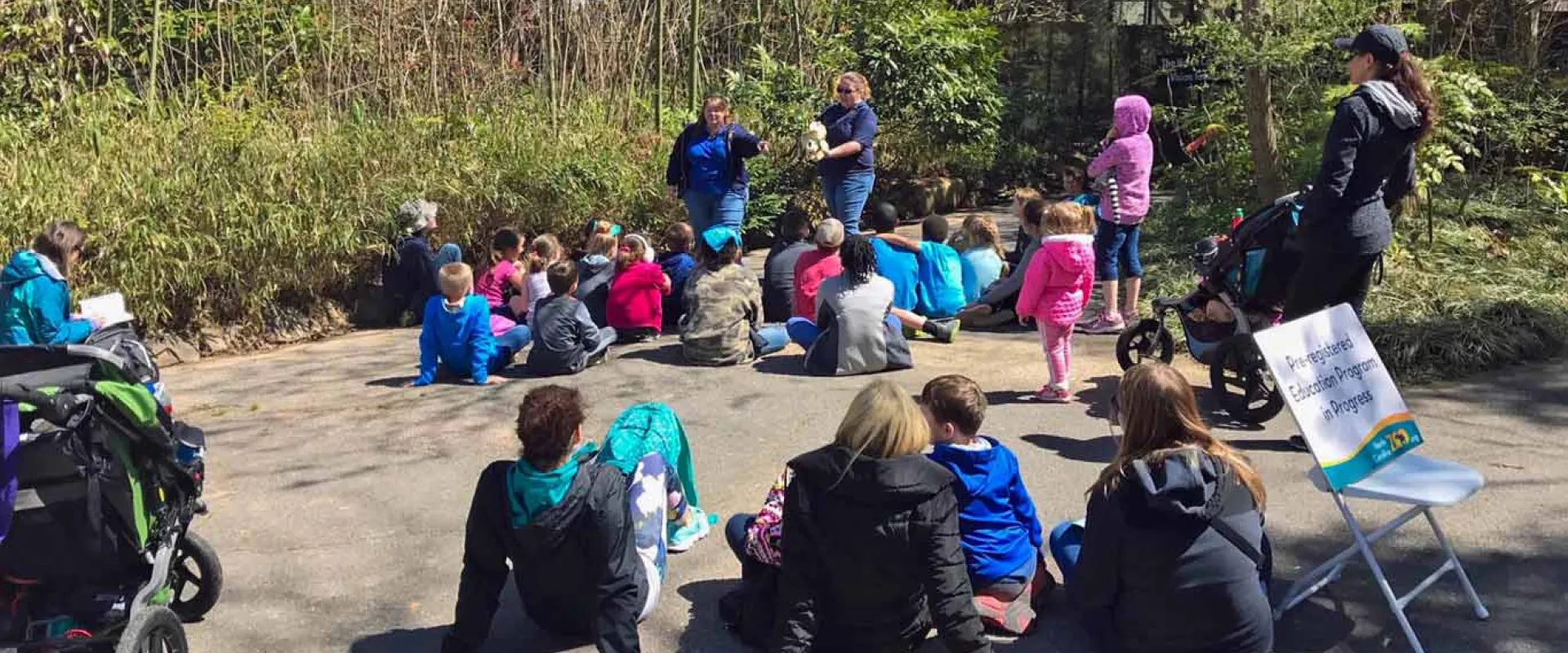Ed-Zoo-Cation Group Programs
Looking for a way to spend some wild time with your non-school group or organization? Let the North Carolina Zoo provide a unique and fun learning opportunity through one of its Ed-Zoo-Cation programs. These programs are for groups of all ages including adult only groups. Through exciting hands-on activities, the education staff at the Zoo will introduce your group to topics ranging from animal care to food chains to climate and conservation issues. Participants will connect with animals, discover the need for healthy habitats, and actions they can take to help protect our Earth’s precious natural resources.
On-site: Ed-Zoo-Cation programs are offered year-round to groups. These exciting programs are available any time from 9:30 a.m. - 3 p.m., seven days a week. Dates, however, are subject to availability. Minimum group size is 12 total participants (children and adults combined). Suggested group size is no more than 30. Larger groups can be accommodated, but interaction with materials may be limited. Please allow 45 minutes per program.
Fee for each presentation is $75.
Contact the Zoo at least three weeks in advance to request a program. To schedule a program, call the Zoo's Conservation, Education and Science Division at 336.879.7719 or email your request. Connect with the Zoo today to get inspired about wildlife!
| Target Audience | Program Description |
|---|---|
| Ages 5-7 | Animal Adaptions How do animals survive the challenging environments they live in? All animals have special characteristics that allow them to thrive in the natural world. Touchable biofacts and live animals help us tell the story of physical and behavioral adaptions. |
| Ages 5-10 | Magnifi-senses Can you believe that some owls love to eat skunks? OK, so maybe their sense of smell is not great, but most animals have excellent senses that help them survive. Through activities, discussions, live animals and biofacts, explore what makes some animals sense-sational. |
| Ages 8-13 | Arctic Awareness The cold, white Arctic is actually full of life, but this fragile ecosystem is in trouble. We will share how many animals of the Arctic survive in this frigid home, what's happening to this unique habitat, and some simple things we can all do to help it stay nice and cold up there. |
| Ages 8-13 | What's on the Menu? Food chains help us identify who eats what...or whom. Participants will discover how much information can be found in an animal's skull, how teeth determine what you eat, and how some animals avoid being on the menu of others. |
| Ages 8-18 | Reptacular Adventures Slither on in and learn some cool facts about these cold-blooded creatures! Participants will get a hands-on experience with some reptile biofacts and meet some live animals. |
| Ages 8-18 | Working Animals From service animals to rescue dos, animals help humans every day. Learn more about why animals are so important and how they are trained to be the best at their jobs! |
| Ages 8-18 | Keeping a Zoo A zookeeper has a lot of responsibilities. This program will explore what the keepers need to know and what they do at work every day! Using biofacts and a few live animals, you will learn part of what it takes to be an awesome zookeeper! |
| Ages 8-18 | Backyard Buddies Who's in your backyard? Come discover your North Carolina neighbors by interacting with some amazing biofacts and meeting some live native wildlife. |
| Ages 16+ | Conserving Megafauna This program investigates the many ways that the NC Zoo is supporting global conservation efforts for the magnificent animals that lead the way for conservation. |
| Ages 16+ | Fighting for the Underdogs All animals matter, not just the big and fluffy ones. This journey takes participants through some of the slimy, scaly, and less well-known conservation stories that the NC Zoo takes part in. |
| Ages 16+ | Supporting Zoos Why do zoos exist? How do places like the NC Zoo support animal welfare and conservations missions? This program will lead discussion as to why and how you should support various facilities. |
| Older Students | Special programming may be available upon request. Program development fees may apply. Please allow six weeks for new program development. |




